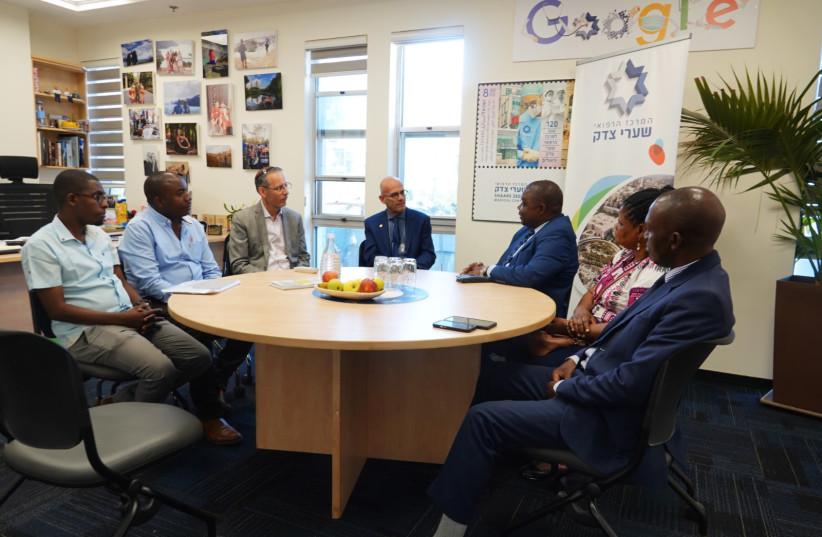Shaare Zedek staff arrange for equipment and provide ongoing support to Zanzibar
With 800,000 people living on the island, and located 35 kms off the coast of east-central Africa in the Indian Ocean, Zanzibar needs help with medical care.
The Tanzanian archipelago island has an average life expectancy of only 66 years compared to Israel’s 82.
Prof. Gabriel Izbicki, director of the Lung Institute at Jerusalem’s Shaare Zedek Medical Center (SZMC), traveled to the island with SZMC colleagues and learned about the lack of basic medical equipment and knowledge about lung diseases in Zanzibar hospitals.
About a year and a half later, he arranged to bring a medical team to Israel for a week of learning and arranged donations of essential medical equipment.
History of Zanzibar
In 1964, Zanzibar (Swahili Unguja) merged with Pemba Island and some other smaller ones and Tanganyika on the mainland to form the United Republic of Tanzania.
 Gabriel Izbicki meets with medical professionals from Zanzibar. (credit: SHAARE ZEDEK MEDICAL CENTER)
Gabriel Izbicki meets with medical professionals from Zanzibar. (credit: SHAARE ZEDEK MEDICAL CENTER)“Our project began about a year-and-a-half ago,” recalled Izbicki. “We visited two hospitals and gave lectures on lung diseases – mostly COVID-19, asthma, and chronic obstructive pulmonary disease (COPD), which is mainly a disease found in smokers. It was then at the peak of the Coronavirus pandemic.”
At the Al-Rahma Hospital in the capital city of Zanzibar, they were impressed by the level of the staff’s knowledge.
“They understood quite well the diseases, types of treatments, and the various inhalations,” Izbicki continued. “But when I asked them if they do tests to diagnose asthma and COPD, they said no. I was surprised and asked them if they referred patients to another hospital, and they again said no. I asked why, and they said that neither of them had the necessary medical equipment.”
Izbicki discovered that there is not even one spirometer, a basic lung function device that measures the amount of air you can exhale in one second and the total volume of air you can exhale in one forced breath.
These measurements are compared with a normal result for someone of one’s age, height, and gender to show if the lungs aren’t working properly. A basic device is the size of a phone that one can connect to a computer to use.
Izbicki continued that it’s “impossible to distinguish between asthma and COPD without this device. If you take care of such patients without it, you can give them bad treatment that may worsen the disease to the point of severe asthma attacks and even death. They don’t have the device because they don’t have enough money.
Asthma is a relatively common disease, about eight percent of Israeli adults suffer from asthma. COPD affects about 20% to 30% of smokers. If the patients do not receive the appropriate treatment, they may suffer from repeated flare-ups and/or severe attacks and die from their disease at a younger age than in the general population. Because of Zanzibar’s short life expectancy, the retirement age there is 60.”
As he and SZMC colleagues toured the hospital, he saw that most of the medical equipment was old and in bad condition. At the other hospital in the north of the island, they saw, on the top floor, a huge room with a large window full of modern medical equipment.
All the devices were very good and donated, but they were in a locked room there was no one who knew how to use them.
“From this, I understood that if we donate to them spirometer, train them in Jerusalem, and give them support afterward for as long as necessary, they will be much better off,” Izbicki said.
The Lung Institute director arranged for a pharmaceutical company to finance the project. Along with a laptop computer and 1,500 filters, so they could do the first 1,500 tests, the cost of a spirometer was only NIS 12,000.
“We decided to bring a doctor and nurse here for almost a week. It was a long and bureaucratic process to arrange their visit, but they finally arrived last week, paying for their plane tickets, a hotel, taxis, and everything else they needed,” he said. “They had a very busy schedule hearing lectures on lung diseases, learning how to operate the device, what to do if there were problems, how to decipher the tests, and more.”
The doctor and nurse had never been on a plane before, and it was even the first time they left Tanzania. In the evening, Izbicki and the Tanzanian ambassador to Israel had dinner with them, and he also asked his brother, Rafi, a certified tour guide, to give them a free tour of Jerusalem.
“The doctor told us that his whole life he dreamed of reaching the region and Israel. He looked for years on the Internet at videos and photos from Israel, long before he even knew he would come here as part of the project. When he was offered to trip to Israel, he was very enthusiastic and excited. For him, he fulfilled a dream to be in Israel, and he brings important medical knowledge and is needed back to Zanzibar.
Dr. Bukuro Nestori said that we came for several intensive days of learning and gaining experience and knowledge at the Shaare Zedek’s Pulmonary Institute. In addition to the medical knowledge we acquired, we also got to know the culture and felt so pleased.
We thank all the staff who participated in the program, and we return with significant and critical equipment and knowledge in lung disease testing. In my name, and in the name of Juma the brother who came with me, and in the name of our hospital and its management, we thank everyone from the bottom of our hearts. Jerusalem is a different kind of city than anything we’ve encountered so far. Jerusalemites were friendly, loving, and welcoming.”





Comments are closed.